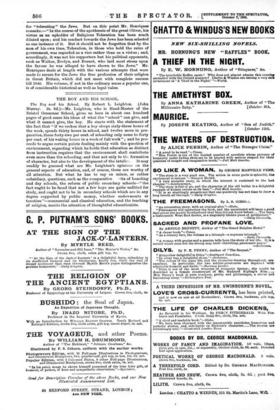for "tolerating" the Jews. But on this point Mr. Henriques
remarks :—" In the course of the apotheosis of the great Oliver, his virtue as an upholder of Religious Toleration has been much dilated upon ; and his conduct towards the Jews has been selected as one instance of it. But it should not be forgotten that by the men of his own time, Toleration, in those who held the reins of government, was regarded as a vice rather than as a virtue ; and, accordingly, it was not his supporters but his political opponents, such as Walker, Evelyn, and Burnet, who laid most stress upon the favour he was alleged to have shown to the Jews." Mr. Henriques deals at length with the various attempts that were made to secure for the Jews the free profession of their religion in Great Britain, which did not meet with complete success till 1840. His volume, if not in the ordinary sense a popular one, is of considerable historical as well as legal value.
THE BOY AND HIS SCHOOL.
The Boy and his School. By Robert L. Leighton. (John Murray. 2s. 6d.)—Mr. Leighton, who is Head-Master of the Bristol Grammar School, gives us here in about one hundred pages of good sense his ideas of what the "school" can give, and what it cannot give, the boy. He starts with the statement of the fact that "if we reckon that a boy sleeps sixty-three hours of the week, spends thirty hours in school, and twelve more in pre- paration, these forty-two per cent, of schooling only come to forty per cent. of his waking hours in a week of full work" ; and he pro- ceeds to argue certain points dealing mainly with the question of environment, regarding which he holds that education as distinct from instruction requires that the environment shall contribute even more than the schooling, and that not only to th( formation of character, but also to the development of the intolle.. It may readily be guessed what are Mr. Leighton's opinions on the general aspects of education, and, of course, these are worthy of all attention. But what he has to say on minor, or rather subsidiary, questions, such as the comparative --its of boarding and day schools, the reform of public secondary schools—" the fact ought to be faced that not a few boys are quite unfitted for study, and ought not to be in secondary schools which are in any degree supported by public money, whether endowments or taxation "—commercial and classical education, and the teaching of religion, merits the attention of thoughtful educationists.


























































 Previous page
Previous page